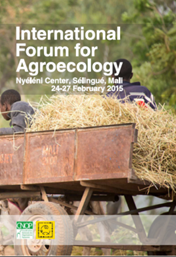
International Forum for Agroecology, Nyéléni Centre, 2015
Full Report downloadable here
NYELENI-2015-ENGLISH-FINAL-OCR
Our diverse forms of smallholder food production based on Agroecology generate local knowledge, promote social justice, nurture identity and culture, and strengthen the economic viability of rural areas. As smallholders we defend our dignity when we choose to produce in an agroecological way. That is why Agroecology is our agenda, and a key element in the construction of Food Sovereignty.
To further this agenda, from February 24th to 27th, 2015, the International Forum on Agroecology, held in the Nyéléni Centre in Sélingué, Mali, West Africa, brought together diverse sectors from around the world to share experiences, knowledge and strategies for the global agroecological movement. During four intense days of work, peasant farmers, fisher folk, herders, indigenous peoples, elders, urban communities, conscious consumers and representatives of civil society came to a common understanding of Agroecology.
We agreed that Agroecology is a way of life, and is based on principles that can and are practiced in many different ways, while always respecting Mother Earth and our common, shared values. We put agroecological food production into the context of ongoing global change: the privatization of the Commons by transnational capital, climate change largely fuelled by the global agribusiness model, and the increasing recognition for the input by social movement actors in the debates that define better directions for social and economic development.
We see Agroecology as a key form of resistance to an economic system that puts profit before life. Corporate agribusiness is a more obvious failure with each passing day. Despite never-ending public-to-private subsidies and colossal energy expenditure, the profit-led food system has been unable to make food accessible to hundreds of millions of people, many of whom live in rural areas. Land concentration, export agriculture, monoculture, giant feed lots, corporate fishing fleets, agrochemical inputs and seed privatization are all part of the same model that has devastated our planet’s soil, sea, freshwater and forest resources, disenfranchised, small-scale food producers and consumers alike, and forced industrially produced food onto the plates of much of the world’s population. The global climate disaster is bringing urgency to the issue of how to change humanity’s corporate dominated food systems.
Full Report downloadable here
NYELENI-2015-ENGLISH-FINAL-OCR
